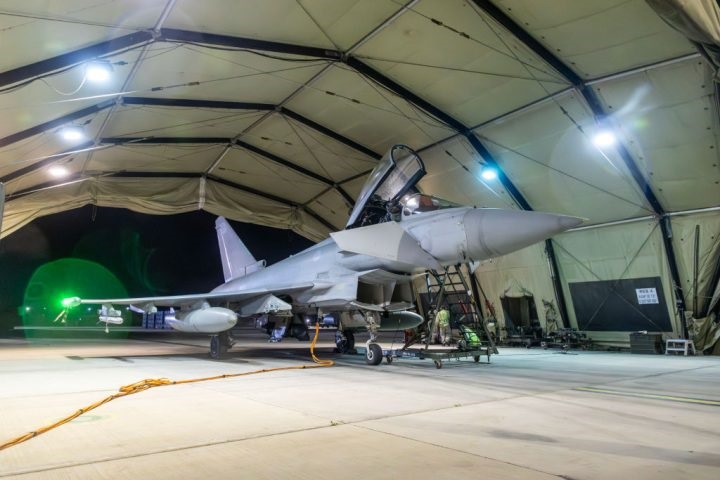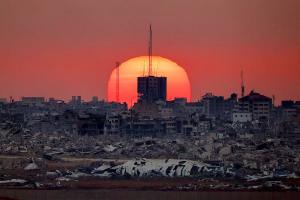The curse of air power is that air strikes always capture the public’s attention. The praise that follows their tactical brilliance can quickly swing to disappointment that they have not proven to be a political panacea. This is the risk that comes with the US and UK air strikes on the Houthi forces currently attacking cargo ships in the Red Sea. It is why the UK’s minister for the armed forces James Heappey was cautious during his media round, rightly stating we should await the battle damage assessment (BDA) before declaring the mission a success.
The trouble is that BDA is a technical, military assessment of accuracy in mission execution — but the problem to be solved is political. The Saudis commenced significant air operations against the Houthis in 2015, expecting a quick, three-week campaign. That campaign evolved and continues today, although at a drastically reduced rate which speaks to its lack of strategic success. What the Saudis discovered is a truism of all military campaigns: the military activity must be stitched into, and form an essential plank of the “theory of victory,” meaning all the elements that would come together to deliver military success. What might the US and UK coalition’s theory of victory look like here?
There is logic in seeing the Houthis as a symptom of the problem and Iran as the cause
The most simple rationale is to eliminate the threat. In this case, the threat is the Houthis’ ability to deploy anti-ship missiles and drones that credibly threaten Red Sea shipping. This requires coalition forces to be able to find and track them, attack and destroy a significant fraction of the Houthis’ arsenal, and then prevent its resupply.
Alternatively, an assessment could have been made that a large, one-off strike will shock the Houthi leadership enough to deter it from continuing and so preserve its forces. This relies on the implicit threat of escalation by the coalition.
Finally, there is the hope that the show of resolve and regional commitment by the coalition will impress on the Houthis’ backers that this is a fight they don’t want, and so get them to apply pressure on the Houthis to stop. The main backer here, and chief resupplier of munitions, is Iran: it is increasingly a threat to the West, as outlined in a paper I co-authored for Policy Exchange a few months ago.
Let us assume, quite reasonably, that the execution of last night’s mission will have been as successful as expected, given it will have benefitted from the “Five Eyes” intelligence and targeting that the US and UK have. But after eight years of air attack by the Saudis, the Houthis have learned much about camouflage and concealment. For this reason we must expect that the strikes are unlikely to have removed the threat to shipping.
Will it have been significant enough to cause the Houthis to think again, or coerce Iran to rein in the leash? The case law on “shock and awe” is that it rarely shocks enough to achieve immediate political results and the Houthis have proved resilient. I suspect one more night of air attacks alone will not sway them.
Nor does Iran have the total control over the Houthis that many assume. The group enjoys a measure of autonomy, although the throttle that Iran has on resupplying them nevertheless gives them great influence. The cost to Iran directly is very low, and it benefits from a further, convenient military distraction for the coalition in the region in the form of the war between Israel and Hamas. Currently Iran has no reason to rein in the Houthis without hard bargaining from the West.
If there is no immediate political win from last night’s strikes, then the West faces a choice. Either it can mount the sort of air policing operation it did over Libya in 2011, to track and suppress the Houthi’s anti-shipping campaign. Or it could look at the wider regional, indeed global, dimension and think about how it might raise the cost for the Houthis’ backers — chiefly Iran — to suppress the problem at source.
In reality, if the coalition stays to police the Red Sea, then it will end up doing an element of the latter, as it did when trying to suppress Iran’s provision of Improvised Explosive Devices (IED) that caused such casualties in Iraq and Afghanistan. Iran is currently engaged in supplying Hamas in Gaza, Hezbollah in Lebanon, and drones to Russia too. It may be a little simplistic, but there is logic in seeing the Houthis as a symptom of the problem and Iran as the cause.
Last night’s strikes will prove, no doubt, to have been tactically excellent. Whether it will yield political results can only be assessed within a “theory of victory” at the core of a full-blown regional strategy. Without this, mapping out the risks and opportunities in any subsequent coalition escalation — which looks increasingly probable — is much more difficult.
This article was originally published on The Spectator’s UK website.


























Leave a Reply